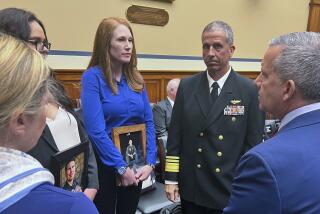Navy Is Told to Stop Work on Plane Congress Wants
- Share via
WASHINGON — Deputy Defense Secretary Donald J. Atwood, in a move certain to reignite passions on Capitol Hill, ordered the Marine Corps Friday to discontinue spending on production of the V-22 Osprey tilt-rotor aircraft, senior defense officials said.
Knowledgeable Pentagon officials said the decision was made after Defense Secretary Dick Cheney ruled out the possibility of seeking new production funds for the futuristic aircraft in the 1991 defense budget, in spite of Congress’ insistence that the program proceed on course.
In a memorandum to the Navy, which oversees the purchase of weapons and equipment for the Marine Corps, Atwood said that it would be wasteful and premature to continue the “advance procurement” of parts for the aircraft when no decision had been made to proceed with the program.
Cheney earlier this year proposed to cancel the program, arguing that it is too expensive and that commercial interests could develop and build the aircraft instead of the Pentagon.
Cheney’s decision caused a furor on Capitol Hill, where lawmakers, concerned over the loss of jobs, joined with traditional Marine Corps patrons to fight the termination of the program.
The Marine Corps had called the Osprey one of its highest aviation priorities and touted the aircraft as a central component of its new strategy to ferry Leathernecks from ships lying far offshore to hot spots over the horizon.
The V-22 contractors, Bell Helicopter Textron and Boeing Co., would receive cancellation fees under existing contracts if the project is in fact killed.
The V-22 aircraft is designed to lift off from a ship’s deck like a helicopter and flies forward like a conventional plane.
After a long-running debate over the aircraft, Congress approved $255 million in research and development funds to keep the program alive, and it deferred until next year any decision on whether production should proceed.
A senior Pentagon official tried to defuse the political controversy Atwood’s decision is expected to stir.
“There shouldn’t have been anything too surprising in this to anyone,” the official said. “If the Congress had fully intended to go along with production, then presumably they would have made it known in the form of production money. But they didn’t.”
More to Read
Sign up for Essential California
The most important California stories and recommendations in your inbox every morning.
You may occasionally receive promotional content from the Los Angeles Times.











